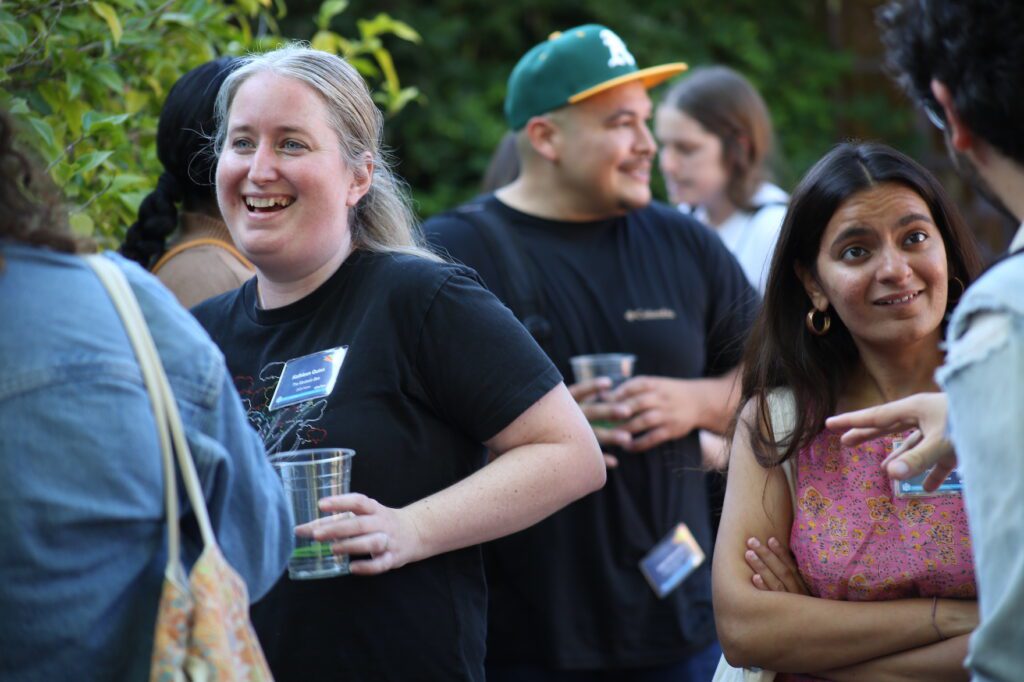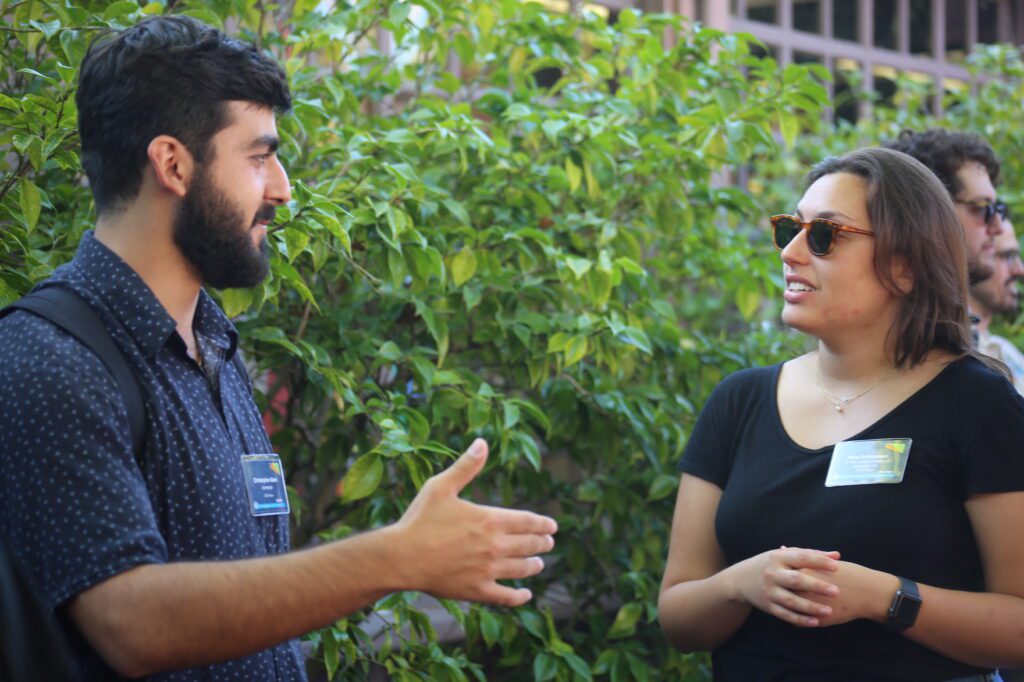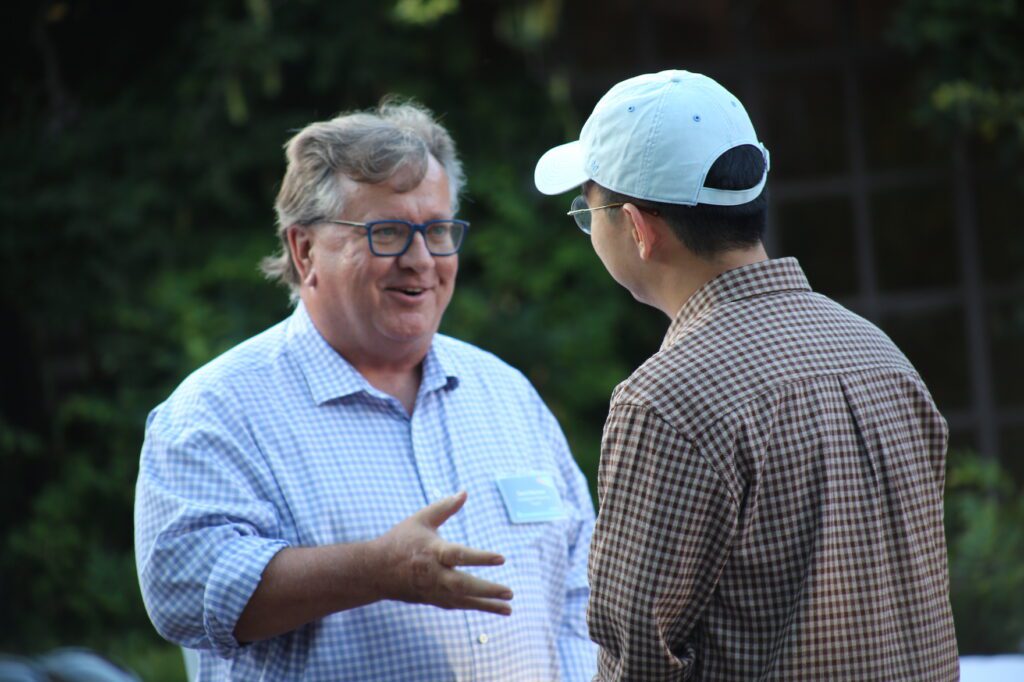The culmination of an intensive four-day orientation at UC Berkeley Journalism for 37 new California Local News Fellows poised to begin local reporting jobs in newsrooms across the state buzzed with community spirit and anticipation.
“The end just feels like camp right now,” said Emma Garcia, a 2024 Berkeley Journalism alum who is working at Peninsula 360 Press to cover San Mateo County, as fellows hugged and took selfies all around her. “Everyone is leaving home, everyone is going to SoCal or Tahoe and everywhere across the state and so everyone is like, ‘No, wait wait, I need your socials! I need to stay in contact!’ We’re all going to plan hangouts.”
Echoing other fellows, Garcia said she was both excited and nervous, but also ready to put the skills she learned at Berkeley Journalism and during the fellowship orientation to good use.
“There was a lot of great energy in the room,” said Katharine Meiszkowski, cohort manager for the California Local News Fellowship program. “One of the magical things about the orientation is just how they all connected with each other and they’ll take that with them as they go out into newsrooms across the state.”
The fellows are now reporting on local news, from Mendocino on the northern California coast to the Inland Empire in the south and dozens of communities in between. This second group of fellows joins the first cohort of 39 fellows, who just finished year one of their two-year fellowship. In total, 76 California Local News Fellows will report across 37 California counties, making the program the largest local news fellowship program in the country. A third cohort will be selected and begin work in 2025.
The fellowship program is a state-funded program spearheaded by California Senator Steve Glazer to invigorate local news coverage in California. The fellows, who were selected through a highly competitive process, receive salaries for two years from the University of California as well as mentorship, training and other types of professional support.
In addition to building community and connections at orientation, the fellows built skills. On day one, they took part in a California Voter Guide workshop with Guy Marzorati, correspondent for KQED, Fellowship Cohort Manager E Okobi and current Fellow Sakura Cannestra, who is based at San Jose Spotlight. They discussed fellowship challenges and opportunities with Don Blount, executive editor at McClatchy, and heard from current fellows about successes, challenges and lessons learned during their first fellowship year.
The fellows explored “Identity and Reporting” with Martin Reynolds, co-executive director of the Maynard Institute; Sasha Khokha, host of KQED’s “The California Report Magazine;” Bernice Yeung, managing editor of Berkeley Journalism’s Investigative Reporting Program; Nicole Chavez, CNN’s Race and Equality Team; and Jeneé Darden, host of KALW’s “Sights & Sounds.”
During that session, the panelists shared the nuances of reporting across differences and how to make deep connections with communities. KQED’s Khokha suggested participating in community life, like volunteering for the board that put on the local film festival and joining a sports team. “Do not leave every weekend to go home to see your friends and family. Put down roots. Be a part of the community. It’s going to help you find better stories and it’s also going to give you some credibility with your sources,” she said.
The experiences and tangible tips offered by other working journalists resonated with fellows.
“The week was really exciting and really motivating and inspiring. I hadn’t felt inspired in a really long time,” said Elsa Cavazos, who will work with Highway 29 Media in Napa. “I have been doing journalism for a while now — for 5 or 6 years — but I actually don’t know what time I start on Monday,” she said with a laugh, noting that she quickly sent her newsroom an email to find out those details.
Fellow Alyssah Hall will work with Black Voice News in Riverside in what she called her first “grown woman job.” She said that after orientation, she felt less nervous and more excited.“It feels like a really awesome journalism family,” Hall said. “I will definitely be reaching out to everybody if I have questions. If there were any issues, I feel like I trust the community I built and that I am a part of here at Berkeley as well as in my newsroom, too. They seem really welcoming.”
Fellow Francisco Manuel Martinezcuello, a Berkeley Journalism grad, said he’s “comfortable feeling uncomfortable” as he embarks on his new job with The Trinity Journal in Weaverville. Martinezcuello said he’ll cover the Trinity River, a tributary of the recently undammed Klamath River, among the most endangered waterways in the nation. He will connect with local tribes as well as non-indigenous government officials for his reporting, all with what he describes as extra tools and backing from the fellowship program.
In a keynote talk at orientation, Professor David Barstow, director of the Investigative Reporting program, spoke with fellows about his time at the Rochester Times Tribune, his first local reporting job. The four-time Pulitzer Prize winner choked up when he recounted how astonished he felt by the responsibility placed on him to cover local communities.
“I cannot believe these people are trusting me to actually figure out what matters for this whole community of 60,000 people outside of Rochester,“ Barstow recalled. “It made me feel like when my wife and I had our first child and the hospital gave us this child and said ‘good luck’ and we were driving home in our little Honda Civic. I couldn’t believe at that time and I can’t believe now that the hospital would let me do that, would let me leave with this precious life. I felt that same feeling having the opportunity to cover these local communities.”
Barstow urged the fellows to use their next two years to figure out especially, who are you as a journalist, what kind of journalist do you want to be and what is your voice? That is one of the most difficult questions to answer and it’s probably one of the most important questions for you to answer over the next phase of your career.”
Tarini Mehta, who will work at The Press Democrat in Napa, summed up the orientation experience: “More than anything, all of us got to spend time together. Now we know for a fact that we have a community to rely on as we set forth on this exciting new path.”




